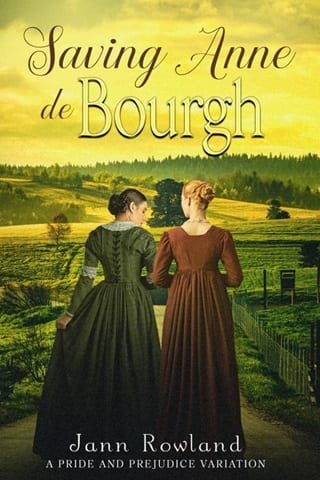Chapter IX
K itty Bennet was the Bennet sister most likely to lack confidence.
It was a facet of her character of which Kitty was not unaware, though she did not think it was surprising. In a house ruled by a nervous mother and an indifferent father, she had often thought it would be the easiest thing in the world to fade into the background, just as Mary did so often. Mr. Bennet favored Elizabeth, and to a lesser extent Jane, while her mother's favorites were Lydia and Jane. Kitty could see why everyone loved Jane, for her character was such that it was impossible not to esteem her the moment one made her acquaintance. As for Elizabeth and Lydia, well Kitty supposed it was Elizabeth's cleverness, so like her father's, and Lydia's liveliness, much like that of her mother.
Kitty had never wished to fade into the background, and she certainly did not wish to become as bookish and isolated as Mary. Kitty sometimes thought that Lydia abused Mary more than she ought. Mary was not deficient, though her interests were not Kitty's. Kitty admired all her sisters for different reasons, even if she did not wish to emulate them.
One thing Kitty was not was stupid, though she sometimes gave the impression of obliviousness. Many times, her mother favored Lydia over her, to the point of allowing Lydia free rein with her possessions or even indulging in actions that might earn Kitty a reprimand. It was not fair, but she did not suppose that ever crossed her mother's consciousness. This business of Lydia going to Brighton was an example of that, for Kitty suspected that her mother would not be so supportive if the invitation had come Kitty's way instead of Lydia's. Kitty could do nothing about that, of course, though it pained her to be excluded when she was two years older. A part of her wished her father would forbid Lydia from going, for then she would learn how it felt to be denied.
In the present circumstance, Mr. Wickham's actions confused Kitty, and she wished to withdraw to Longbourn. Yet Lydia was being her usual pigheaded self, refusing to depart until she puzzled out the meaning behind Mr. Wickham's behavior.
Mr. Wickham was not one of Kitty's favorites, though Lydia had praised him to the skies until he showed interest in Mary King. Though she could acknowledge his handsome features, there was also a shifty look about him, one that suggested he understood the effect of his looks and used them to his advantage. It was nothing upon which Kitty could ever put her finger, but it made her cautious in his presence.
Now, however, the man appeared to be showing his true colors, for his means of brushing Lydia aside was unkind, even from a man who did not believe he needed to impress the local populace any longer. Then he walked south down Meryton's main street, his attitude that of one who was looking for something. Or someone. Kitty did not know what he was about or for what he searched but given his behavior she did not wish to have anything further to do with him.
"Come, Lydia," said Kitty for what seemed the fifth time. "Mr. Wickham has changed, and you did not like him much before he went away. Let us return to Longbourn."
"I shall not go away until I know what he is doing," replied Lydia.
It was not an angry reply or a cold retort, both of which Lydia often employed. It was a complete disregard for Kitty's opinion and wishes. Kitty was intimately familiar with Lydia's single-minded focus on whatever caught her attention. It still hurt when Lydia so carelessly discarded her opinion, but it was certainly not enough to cause particular pangs, given how often it had occurred in the past.
"Look, he is returning," said Lydia.
Kitty noted her sister was correct, for Mr. Wickham had reached the end of the street and had turned to make his way back into Meryton. Frustration marred his features, for he wore a scowl that rendered his handsome mien ugly. Kitty was almost afraid of him.
Then he appeared to change in an instant, for he caught sight of them, and a calculating expression replaced vexation. A moment later he changed again, for he smiled at the sight of them as if he had not just dismissed them moments before. With a greeting on his lips, he approached, the same man he had been when he had been a member of the regiment. With a start, Kitty realized it was a mask he donned with as much efficacy as he put on his trousers or his coat.
"Miss Kitty, Miss Lydia," said he, bowing before them. "How do you do?"
Lydia could be such an empty-headed flirt sometimes, for she forgot at once how this man had treated them. "We are well, Mr. Wickham. It is so nice to see you return."
"Thank you." The man paused and then said: "I find myself in a bit of trouble, ladies, for I have lost my companion."
This provoked Lydia's interest. "You were traveling with someone else?"
"I was," confirmed he. "She is a young woman, perhaps five and twenty."
A grin appeared on his face and he stepped forward as if to offer a confidence: "She is rather thin and pale, and sickly and cross besides. But a friend asked me to escort her to her mother's home, which is why we are here—our path leads further to the north."
"A woman you say?" asked Lydia.
She had not appeared happy to hear that Mr. Wickham was traveling with a woman but had perked up at the inference that Mr. Wickham had no interest in her out of the common way. Kitty was not so certain, for it was most improper for a man and a woman unrelated to be traveling together alone. Would anyone put a beloved relation into so improper a situation?
"Yes," replied Mr. Wickham. "Anne has likely wandered into a shop to look at ribbons or other such nonsense, giving no thought for how her disappearance would worry me. I would be much obliged if you consented to help me search for her."
It was not what Lydia wished to hear if her pursed lips were any sign. It was not in Lydia's nature to refuse such a handsome man, as she proved with her next words.
"Of course, Mr. Wickham. We should be happy to help you find her."
"Excellent," said the man. "You have proven the fond memories I retain of this neighborhood with your willingness to help. Anne is slender, approaching gauntness, and has dark brown hair, a shade darker than even your sister, Elizabeth. She is also perhaps the same height and is wearing a pale blue gown with a navy spenser over top."
"A spenser?" snorted Lydia. "On such a warm day as this?"
"Anne is of a delicate constitution, Miss Lydia," replied Mr. Wickham, not caring at all for Lydia's rudeness. "Her mother insists she dress warmly, so she does not catch an ague."
Lydia regarded Mr. Wickham with disbelief, a feeling Kitty could own to understanding. Though it was still early June, it was a day of such warmth that she felt herself perspiring in her thin day dress with no other encumbrance. Saying nothing else, Lydia assented and pulled Kitty away back up the street toward Longbourn, promising to inform Mr. Wickham the moment they discovered the woman's location.
"There is something wrong with this, Lydia," murmured Kitty to her younger sister. "I think we should return to Longbourn and leave Mr. Wickham to find his companion."
"Nonsense, Kitty," said Lydia, brushing her opinion away. "Do you not think it strange that Mr. Wickham is traveling with a young woman alone?"
It was at times like this that Lydia proved that she too knew how to think critically, though Kitty judged that Lydia rarely used that ability.
"No, Kitty, I suspect something else at work here, and I mean to discover what it is." Lydia snorted with suppressed laughter. "Do you not suppose he is eloping with her? Given the description, she sounds like a dowdier version of Mary. How much of a joke would it be if handsome Mr. Wickham were to elope with a woman as unappealing as this Anne sounds?"
"A joke it may be, but I doubt it is one to cause much laughter."
"Yet, I mean to laugh as much as I can," persisted Lydia. "It shall serve him right for what he has done since he came to Meryton. Imagine it, Kitty! The most handsome officer we have ever seen pursued Mary King, a nasty, freckly little thing as far as Liverpool, and has now involved himself with a waiflike woman whose defining features are her sickly and cross temperament. When he departs with her, I shall laugh at him for his future with such a contemptuous creature."
"I cannot but suppose he prefers her for a reason other than her face or form," replied Kitty.
"And I cannot disagree," snorted Lydia. "No doubt she is some heiress with a fabulous fortune, for who else would marry such a woman?"
Kitty decided it would be better not to respond. Though she agreed with Lydia in general, Lydia could be a little too eager to say nasty things about another; as she often directed her comments at Kitty herself, she had intimate knowledge of it and did not wish to listen to her sister's unkindness.
For a time, they searched along the avenue, peering into shops or even entering for a moment to search locations they could not see from the window. Wherever this woman had taken herself, she did not mean to be found, for all their searching was fruitless. Kitty was on the point of insisting they abandon the search altogether and return home when the sight of a pair of familiar figures caught her attention.
"Look, is that not Jane and Lizzy? They appear to be making for Longbourn—we should go with them."
It was their sisters without a doubt, for they had left Meryton and were just passing into the trees to the north of the town when Kitty espied them. What she had not noticed was the figure who walked with them.
"It looks like Mr. Wickham's lady is with them," observed Lydia.
"It is difficult to say," tried Kitty, noting the woman in blue walking with them.
"The color of her dress and spenser is exactly as Mr. Wickham described," said Lydia. As they watched, the ladies disappeared into the trees, and Lydia added: "It is difficult to tell much more from this distance, though she appears thinner than Lizzy. Come, Kitty, let us inform Mr. Wickham."
"I am not certain that is wise, Lydia," said Kitty, fretfully pulling on Lydia's arm. "Come, I think it is better if we follow our sisters home to Longbourn."
"No, Kitty," said Lydia, pulling her arm away. "I mean to discover what Mr. Wickham is about."
As Lydia walked away, Kitty watched her. She was torn between following her and keeping her from trouble or hurrying after Elizabeth and warning her of what Lydia meant to do. As the woman was leaving Meryton and in the company of her sister, Kitty was certain she did not wish to be discovered by Mr. Wickham. What that meant in relation to the man's story she could not say, but visions of the woman as a kidnapping victim while Lizzy heroically saved her danced through Kitty's head.
In the end, it was the need to ensure Lydia's wellbeing from her headstrong ways that decided Kitty's course and sent her following Lydia. Kitty had not liked the way Mr. Wickham had changed as if he were a court jester acting out a drama for his liege lord. A man that mercurial might be a danger to her sister, a danger Kitty meant to mitigate.
It took them some time to find Mr. Wickham, a circumstance Kitty thought was beneficial, allowing Lizzy precious time to reach the safety of Longbourn. After the fact, she was certain Mr. Wickham had essayed to search the lesser traveled roads of the town and some smaller establishments one could find if they knew the area. The mile walk to Longbourn would take perhaps fifteen minutes to accomplish, longer if one dawdled on the path. Kitty had seen nothing of hesitation in Jane and Elizabeth's gaits as they had walked away, and she was certain they would cover the distance quickly.
Thus, she distracted Lydia where she could, pointed out a bolt of cloth in the dressmakers or a lovely shade of ribbon in the haberdashers as they passed. It was nothing they had not already seen that day, but Lydia was often easily distracted, and that day was one of those days. It was more than five minutes before they found Mr. Wickham, perhaps closer to ten.
"Is your father's estate much farther?" asked Anne for what seemed the tenth time. "It seems we have traveled a hundred miles rather than only one."
Elizabeth shook her head, using every ounce of her willpower to avoid snapping at the young woman beside her. On an occasion or two, Elizabeth had stayed in London for a time with her aunt and uncle, making the journey back to Longbourn with them when they returned for Christmas or some other event. On those occasions, traveling with her younger cousins, who were well-behaved children, had been a trial, for they had often asked how much longer it would be until the journey was complete. Anne's behavior reminded Elizabeth of her cousins, not a flattering comparison, considering she was a woman of five and twenty while the eldest of her cousins was only ten.
"These are your father's lands?" asked Anne.
Turning to regard her, Elizabeth noted Anne looking about, though with how much interest she could not say. "The lands to the west," Elizabeth pointed to her left, "belong to my father, whereas that to the right belongs to Lucas Lodge. Sir William is Charlotte's father."
"Oh yes, of course," said Anne, though appearing to care little. "These are not large estates, then."
"Longbourn is the largest in the district," supplied Jane, "except for Netherfield, which is north of Lucas Lodge."
Anne sniffed with disdain. "Rosings Park, my family estate, must be much larger, for one cannot walk the entire length of it in a single day."
As Elizabeth could attest herself, it was possible, though it would take much longer than even she usually liked to roam. It would not be politic to make such a comment to Anne, who was appearing more like her mother every minute. She could imagine Lady Catherine making just such a statement and with not a jot more haughtiness than Anne had just displayed.
"Then this Netherfield shares a border with your father's estate?" asked Anne.
"A long border," said Elizabeth. "I often walk my father's estate, especially north of the house which is far more extensive than the lands to the south, and one path in particular takes me along the border with Netherfield to a rise that boasts a fine view of Netherfield's lands below."
Anne regarded her with interest, her arrogance again gone for the moment. "Then what my mother often said of your propensity to ramble all over the estate is the truth."
"I own it without disguise," said Elizabeth. "For I am fond of walking, both for the exercise it offers and the time it allows me to enjoy the beauties of nature."
The response of a sniff of disdain did not surprise Elizabeth in the slightest. "I much prefer my phaeton."
"Yes, I can imagine touring Rosings with a phaeton must be fine, indeed," said Elizabeth. "But you must confess there is not much exercise in such an endeavor, except for your trusty horse."
"That is something I never considered," replied Anne, frowning at the notion. "My mother has often said that walking is for the lower classes."
Elizabeth laughed at the absurdity of such a statement. "If you will pardon my saying it, that is nonsensical. Everyone must walk, for we do so every day unless we are bedridden."
"I enjoy walking too," said Jane in her usually quiet tones. "While I do not range nearly so far as Lizzy, it is refreshing to take a turn in the gardens behind Longbourn."
"Does your father's estate boast extensive gardens?" asked Anne, seeming curious.
"Not nearly so extensive as those at Rosings," replied Elizabeth. "Rosings is a much greater estate than Longbourn, so that is no surprise. It is rather smaller than you are accustomed to, but we enjoy it nonetheless."
The way Anne regarded her, Elizabeth suspected she had never considered it in such a way. To one born and raised in privilege, the way they lived must be superior to all other ways of life, if they could imagine other customs at all. As sheltered as Lady Catherine had raised her daughter, Elizabeth knew they were confronting her with the differences for perhaps the first time.
"My mother said that your father's estate will devolve to Mr. Collins by an entail."
"That it will," was Elizabeth's cheerful reply.
Anne regarded her with curiosity. "Then why did you not accept Mr. Collins's proposal? Would the prospect of living the rest of your life in the home you have always known appeal to you?"
"There are several fallacies in your suggestion," replied Elizabeth. At Anne's look, part interest part demand, she continued: "First, my father might live for many more years, so I would not live the rest of my life at Longbourn should I marry Mr. Collins."
"Yes," said Anne with a frown. "In that, I suppose you must be correct."
"The second reason is more of a matter of temper and preferences," said Elizabeth. "Mr. Collins and I do not suit as life partners."
"And you suppose Mrs. Collins is a match for her husband?"
"That is a matter for her to decide, which she has done." There was little reason to say that Elizabeth held any notion that Mr. Collins could be a match for Charlotte as absurd, but she did not wish to say so to this woman. "When she made her position clear, all I could do was congratulate her and wish her well."
"Which you did because you are an excellent friend," said Anne with a nod. She paused a moment and then ventured: "In all honesty, I do not consider my mother's parson to be an impressive specimen."
Elizabeth almost choked on her tongue with the need to laugh; it was nothing less than an extreme understatement. Had Anne offered it in any other manner, she might have suspected her of an attempt at dry humor. Anne's next words proved any such supposition incorrect with no ambiguity.
"I understand your position, Elizabeth, but a marriage is more than simply temperament. If you will excuse me, I suspect your position is not a fortunate one. By marrying your cousin, would that not have provided for your mother and sisters?"
"When you say it in such terms, I cannot disagree," said Elizabeth amiably. "Some may call my sensibilities foolish. Yet I have always considered an unequal marriage to be the greatest evil, for the man you marry is one you must endure all your life if you make an erroneous decision."
"Yes, I suppose you must be correct."
"If you will pardon my impertinence," said Elizabeth, uncertain she should say anything on the subject, "did you not make a similar decision? After all, you ran away from your home intending to marry Mr. Wickham when your mother has always insisted that you are engaged to Mr. Darcy. Is the thought of marrying him so onerous that you would put yourself in the power of a man you do not know well?"
Anne grimaced though she did not dispute Elizabeth's assertion. "I suppose you are correct, though I will say that the notion of Darcy as a husband is not onerous."
"Then what provoked you to accept Mr. Wickham's overtures?"
At this, Anne became tight-lipped, saying only: "Matters at Rosings dictated my interests were better served by departing at once."
The meaning of Anne's statement was not clear, though Elizabeth could make one or two educated guesses. As it did not seem prudent to pursue a subject Anne did not wish to discuss, she changed tack.
"I hope we can notify your family at once, for I am certain they must be frantic with worry for you."
Again, Anne ventured little, except to say: "I shall write to my uncle when we arrive at your father's estate."
This further confirmed Elizabeth's conjecture, though she refrained from saying anything more. For the next several moments they strode toward Longbourn in the distance, Elizabeth now able to make out the church's spire rising from the trees. It was interesting, she thought, that Anne had forgotten all about her peevish annoyance at being forced to walk to Longbourn. She also did not appear to be so winded as Elizabeth might have suspected for one who had never walked so much as a mile. Perhaps she was not so frail as Lady Catherine had always insisted.
"We appear to be approaching a place of some prominence," observed Anne, catching sight of the spire as Elizabeth had.
"That is Longbourn church," said Elizabeth. "It is part of the village just outside Longbourn's gate. We should arrive within a few moments."
Anne considered this. "Thank you, Elizabeth. While you might not credit it, I believe I have never enjoyed a walk so much as I have today. The life to which you are accustomed differs from my experience, but I do not think it is less worthy for all that it is unfamiliar to me."
"That is the spice of life, is it not?" said Jane. "To experience how others live gives us some insight into them."
"I suppose you must be correct," replied Anne, again beset by her thoughts.
"And yet," said Elizabeth, "having visited Rosings, I cannot say our lives are all that different from yours. Whether high or low, gentle families the kingdom over manage their properties, tend to their tenants, visit and socialize, and if we are fortunate, perhaps we may even attend an assembly or two. We are far more alike than a gentleman is to a laborer."
Anne turned to Elizabeth and smiled. "It seems you are much more than my mother ever allowed, Elizabeth, for you have given me many things on which to think. If you will consent to it, I believe I should like to continue our acquaintance when I must leave your home."
"I would like that, Anne," said Elizabeth, meaning every word. "Will your mother approve do you think?"
"Perhaps she will not," confessed Anne. "But if I am honest, I care less for what my mother thinks than I did only this morning. Should matters proceed as I hope they will, my mother will not be an impediment."
"Then let us call it settled," replied Elizabeth warmly.
By then they had made the village, the gates of Longbourn appearing at the end of the street. They hurried down the boulevard, eager to reach the safety of the house against the possibility of Mr. Wickham discovering their flight and entered the drive with no sign of pursuit.
Determined to inform her father of their doings, Elizabeth beckoned to Anne and stepped through the door into the vestibule, where Mrs. Hill met them. She said nothing about Anne's presence, contenting herself with welcoming her and accepting her gloves and spenser. When they had doffed their outside accoutrements, Elizabeth beckoned her friend to follow her into the house.
 Fullepub
Fullepub 



